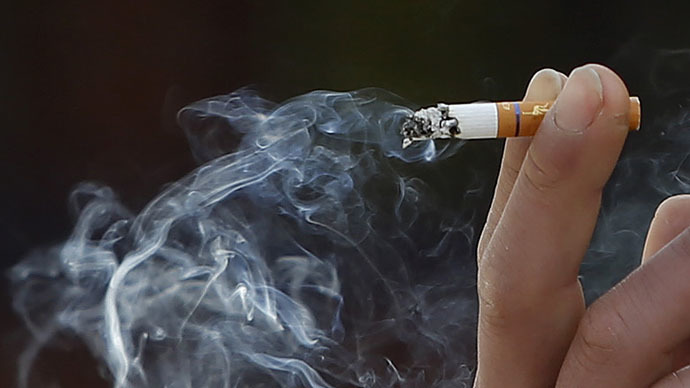Smokers may be at greater risk of developing psychosis – study

Researchers in the UK have suggested that smoking tobacco is linked to an increased risk of developing psychosis, while people who develop illnesses like schizophrenia are three-times more likely to smoke than the general public.
The research was undertaken by British university Kings College London, with the material being published in the Lancet Psychiatry journal. While there have been numerous studies showing the association between smoking cigarettes and psychosis, very little research has been conducted to see if tobacco could have an impact in increasing the risk of psychosis.
READ MORE: New research reveals why animals don’t get schizophrenia and humans do
The researchers analyzed 61 studies, which gathered data from 15,000 smokers and 273,000 non-smokers and found that 57 percent of those who went on to develop psychosis were in fact smokers.
“Excess dopamine is the best biological explanation we have for psychotic illnesses such as schizophrenia. It is possible that nicotine exposure, by increasing the release of dopamine, causes psychosis to develop,” Professor Sir Robin Murray, Professor of Psychiatric Research at King’s College, said in the report.
The report also found that, people who developed psychosis were three times more likely to be smokers than non-smokers, while regular tobacco users developed psychotic illness around a year earlier than non-smokers.
"It has long been known that people with a psychotic illness such as schizophrenia are far more likely to smoke both cannabis and tobacco,” Marjorie Wallace, the chief executive of the mental health charity SANE, said.
READ MORE: Extra strong ‘skunk’ cannabis linked to 25% of psychosis cases – study
She added that scientists believe there is a direct link between cannabis and the levels of dopamine, which is the (the chemical messenger in the brain which is related to psychotic experience). However, there is less evidence of a similar relationship between nicotine and the brain.
"What we need is more research before taking further steps to deprive people whose only relief from the chaos and distress in their minds comes through smoking. We should aim to find ways of separating any beneficial components of both cannabis and tobacco which alleviate mental pain, while eliminating those that can damage physical health as well as potentially contribute to psychotic illness," Wallace added.
However, it may be too early to take the finding too seriously at present as the researchers said that some of the studies they undertook did not take into account other factors. These include whether a smoker is also a regular marijuana user as the drug has also been linked with increasing the likelihood of developing psychotic illnesses.
Massive amount of interest in the smoking/psychosis meta. So we've made it free to access if you register an email. http://t.co/98G2ZrypLD
— Lancet Psychiatry (@TheLancetPsych) July 10, 2015
“While it is always hard to determine the direction of causality, our findings indicate that smoking should be taken seriously as a possible risk factor for developing psychosis, and not dismissed simply as a consequence of the illness,” one of the authors, Dr. MacCabe, said in the report.
Dr. Sameer Jauhar, a research fellow from King’s College said that longer term studies are needed, but it could also be another important reason for smokers to kick their habit.
“Longer-term studies are required to investigate the relationship between daily smoking, sporadic smoking, nicotine dependence and the development of psychotic disorders,” he said. “In view of the clear benefits of smoking cessation programs in this population every effort should be made to implement change in smoking habits in this group of patients.”












